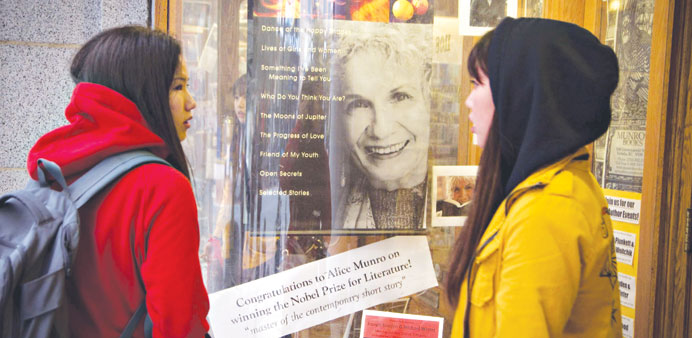|
News that Alice Munro was awarded the 2013 Nobel Prize for Literature delighted Canada, where writers have for years felt underappreciated despite their contributions to world literature. |
Munro is arguably the first Canadian to receive the prize from Sweden’s Nobel Academy - Montreal-born Saul Bellow moved to Chicago at age nine and is identified as an American author.
And, with typical modesty, she said on accepting the award on Thursday that she felt pleased not just for herself, but for the shot in the arm that the award gives writers throughout her home country.
“I’m particularly glad that winning this award will please so many Canadians,” Munro said. “I’m happy, too, that this will bring more attention to Canadian writing.”
Throughout Canada, Munro’s compatriots basked in the world recognition now accorded to one of their own.
“Alice Munro’s Nobel Prize for Literature will give Canadian writers the worldwide recognition they have long deserved,” tweeted Ted Arnott, a member of Canada’s parliament.
Canada has a flourishing literary tradition with luminaries such as Margaret Atwood, Michael Ondaatje and novelist Carol Shields, who was awarded a Pulitzer Prize.
Prominent French language writers in the bilingual nation include Marie-Claire Blais, Anne Hebert, Gabrielle Roy and Michel Tremblay.
Robert Sirman, director of the Canada Council for the Arts, told AFP that he was “over the moon” about the award - as much for his country as for the author herself.
“Our sense is that Canada has been punching above its weight for many, many years now in the literary field, and we believe that this has been recognised internationally,” said Sirman, noting that Munro has also been given Britain’s esteemed Man Booker International Prize in 2009 and numerous other awards.
“At the same time, there’s something symbolic about the Nobel Prize - we can’t deny it—and the fact that competition is particularly high on the global scale,” said Sirman, whose organisation is responsible for identifying and nurturing Canadian artistic talents.
“There’s just something very reaffirming about the fact that Canada finally – finally - gets its place among the many other nations of the world who can claim this particular distinction,” Sirman said.
On Twitter, the hashtags #cancon - for “Canadian content” - and the equally popular #Canadianpride went viral in an uncharacteristically patriotic celebration of Munro’s Nobel.
The Swedish Nobel Academy hailed the 82-year old writer as a “master of the contemporary short story”, a genre that has only rarely been honoured with the world’s most prestigious literary prize.
Even as they trumpeted her achievement, Munro’s countrymen said that there was something quiet, understated and, well, typically Canadian not only about her personal style, but also about the tone and subject matter of her works.
She has rooted her writing in Canada, Sirman said, with stories that “could happen in Quebec as well as it could happen anywhere else in the country”.
“There’s something common about the way that Alice Munro has grounded her voice in small town life. The word that I would use is modesty,” he continued. - AFP

